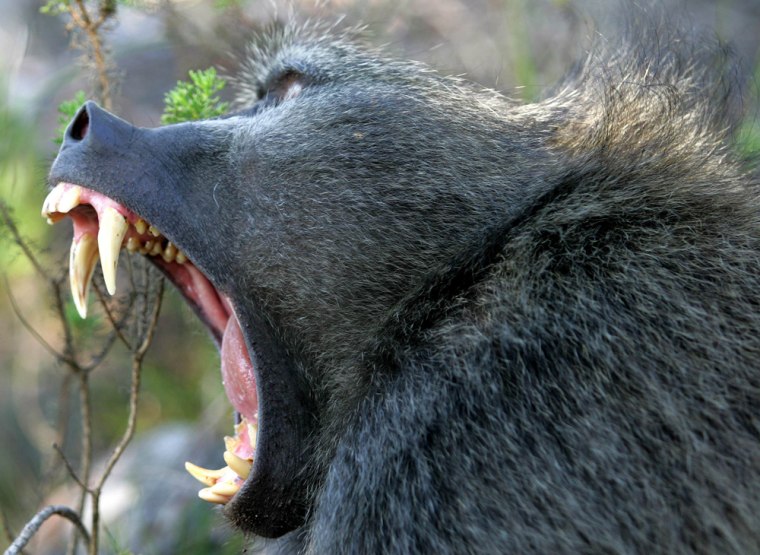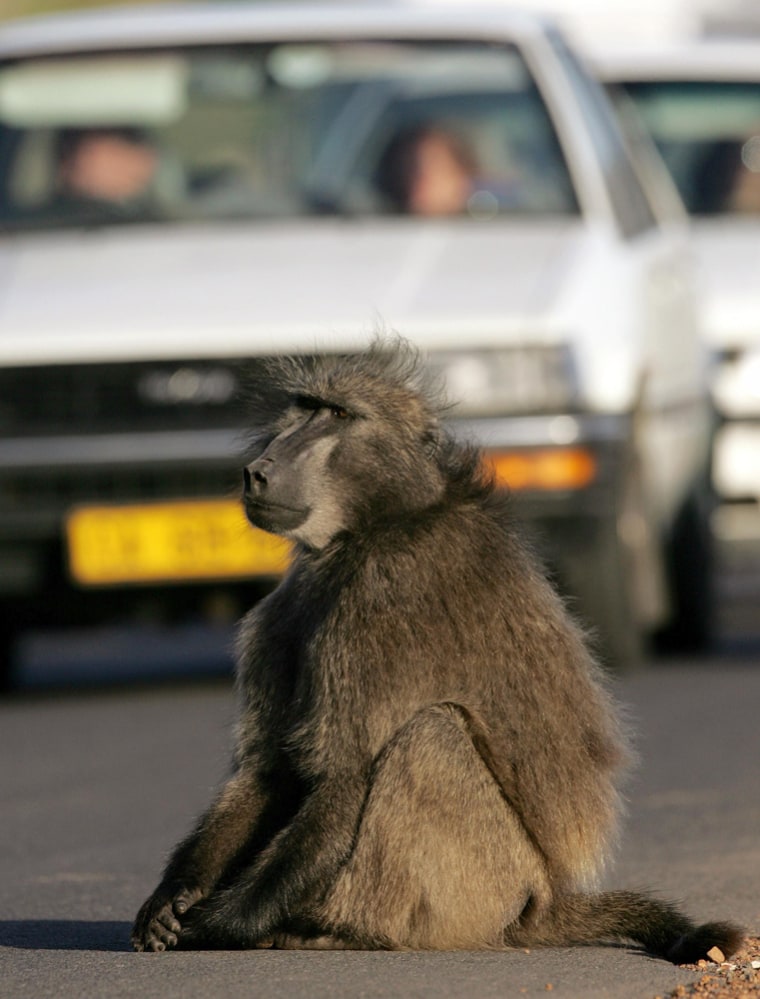Unruly gangs are raiding the expensive homes that line the spectacular coast of South Africa's Cape Peninsula, clearing out pantries, emptying fridges, and defecating over the designer furnishings.
It's baboon versus human in a string of wealthy ocean-front communities 30 minutes from the trendy center of Cape Town, a top tourist destination.
Jenni Trethowan is among those trying to defuse the conflict raging along the picket fences between suburbia and the rugged mountain slopes of the peninsula -- a jagged tooth of rock projecting into the Atlantic ocean.
She takes groups of paying tourists and residents on walks in a nature reserve to see the wild animals as they forage, scratch for fleas and squabble among themselves.
Her aim is to demonstrate that the baboons are worth protecting because of their tourism revenue potential.
"There's George," she said on a recent walk as the first baboon came into sight, slouched on a rock with a clear view of newly built homes about 300 yards away.
George is one of the biggest baboons in a troop of about 20, an adult male weighing some 110 pounds. He yawns languidly, displaying wickedly curved canine teeth.
"If you think how easily a baboon could rip a person apart, the fact that they don't is quite remarkable," Trethowan said.
She led the group through a grove of pine trees. Baboons perched in the branches overhead, breaking cones apart to get at the seeds and occasionally dropping a surprisingly heavy cone onto the tourists below.
The baboons appeared indifferent to the humans, although some of the younger ones approached a boy in the group and pawed at him tentatively before losing interest.
Trethowan has names for all the baboons and stories about many. Two females are missing a hind leg; one was shot and the other was chased off the top of a high-rise apartment block.
"That's Quizzy," Trethowan said, indicating a lone male, named for his quizzical expression. "He's the nicest baboon you could ever hope to meet. I love that baboon."
Quizzy turned at the approach of the tourists, regarding them with profound melancholy.
"Poor boy, he's sick," Trethowan said. "But we have no idea what's wrong with him."
Troop divides, conquers
Trethowan works with a team of baboon monitors, nine men recruited from a poor community whose job it is to shepherd the animals away from built-up areas.
But the baboons know they will find dustbins full of leftovers in the suburban yards and that an open window can mean there is a bowl of tempting fruit within easy reach.

The troop splits into two and they charge across a road toward the houses. The monitors drive some of them back to the reserve, but others hurdle garden walls and grab what they can.
"They're getting used to getting easy food," said Trethowan. "The way to stop it is for people to install baboon-proof garbage cans, put burglar bars on their windows and avoid growing fruit trees in their gardens."
Cases of baboons attacking humans in the peninsula are rare, although earlier this year a child was reported to have been mauled by a baboon scavenging for food at a picnic site on the coast about 20 miles away.
Many residents have anecdotes about baboons.
"I was sitting outside one day, the kids were swimming in the pool, when Eric just flew through the burglar bars and into the house," said Debbie Ellis, who lives in the Imhoff's Gift district. Eric is the alpha male of the local troop.
"It was a bit frightening to see a five-foot-four male baboon standing behind my three-year-old goddaughter."
She said Eric had also "sauntered" into the home of a neighbor, opened the fridge, scattered eggs on the floor, and left droppings everywhere.
Donald Garlick, another homeowner, said baboons and humans had lived in harmony for decades. But in recent years baboons had become problematic, partly because of tourists feeding them.
'Didn't flinch' on being hit
One resident who did not want to be named said he had tried in vain to drive off a big male baboon with a powerful catapult -- against the law because the animals are protected.
"I also hit him with a wooden pole, and he didn't flinch," the resident said. "He was totally fearless. You can be sitting in your front room with a bowl of fruit on the table, and a baboon will come through the door and steal it."
Trethowan said the introduction of monitors had helped but many more would be needed to keep watch over all the baboons in the peninsula -- 253 divided into 11 troops.
Researcher Esme Beamish, who conducted the latest baboon census, said the population had increased 1.6 percent since last year, thanks partly to the work of the monitors who were reducing conflict.
"Baboons in southern Africa are not currently at risk ... but the Cape Peninsula troops are under threat," she said.
She said the troops that had the most contact with humans had suffered a string of deaths in the last year -- four were shot dead, two were killed by dogs, one was clubbed to death, two were run over by vehicles, and one was electrocuted.
